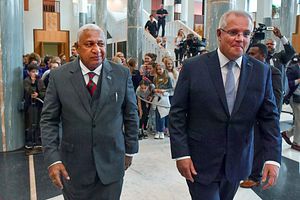Earlier this week, Fijian Prime Minister Frank Bainimarama made his first visit to Australia as his country’s political leader. The Fijian leader was given a ceremonial welcome at Australia’s Parliament House in Canberra, complete with a military guard of honor and a 21-gun salute. Such an embrace of Bainimarama would have been unthinkable several years ago, when the former coup leader was considered persona non grata by the Australian government, and Fiji was suspended from the Pacific Island Forum (from 2009 to 2014).
However, after the restoration of democracy in Fiji in 2013, Bainimarama has become a two-term elected leader, gaining the democratic legitimacy that Australia expected from a Fijian leader. Yet despite his reinvention from a military strongman to democrat, Bainimarama finds himself in Australia’s warm embrace primarily because geopolitical conditions have shifted in his favor. With China’s increased activity in the Pacific, Australia realized it could no longer afford to ostracize the Fijian prime minister. Australia’s strategic calculations demanded that Bainimarama be welcomed back into the fold.
This newfound fondness for Bainimarama has been framed by what Australian Prime Minister Scott Morrison has presented as the “family” relationship between the two countries. The concept being that families can have disagreements, but they are bonded by a connection that is capable of transcending such disputes. In January, when Morrison visited Fiji, he and Bainimarama bonded over their shared love of rugby and their Christian faith; transcendent bonds for sports fans and the religious observant alike.
While on his trip to Fiji earlier in the year, the Australian prime minister signaled there would be a new strategic partnership forged between the two countries, to be known as the Fiji-Australia Vuvale Partnership (vuvale meaning family in Fijian). This would be a comprehensive new partnership agreement covering security cooperation, trade, people-to-people links, greater multilateral cooperation, and increased connections between Australian and Fijian institutions. It was signed by the two prime ministers in Canberra on Monday.
However, between the announcement of the Vuvale Partnership and its signing this week, there was another familial fracas. During the meetings at the 2019 Pacific Islands Forum (PIF), the Australian prime minister blocked efforts by the Pacific Island countries to create a unified regional position on climate change. Morrison refused to acquiesce to a statement calling for a ban on any new coal mines in the region. Bainimarama described Morrison’s behavior in these meetings as “very insulting, very condescending.”
Bainimarama has become a passionate advocate for his region’s susceptibility to the effects of climate change. His advocacy has provided him with an ability to overcome the hurdles that would usually come with being a leader who had initially seized power in a military coup. But instead of hampering Fiji’s diplomatic efforts, its suspension from the PIF in 2009 seemed to embolden Bainimarama, using the situation to carve out a regional leadership role that attempted to circumvent the dominance Canberra and Wellington inside PIF.
The Fijian premier made the calculation that not only should Pacific Island countries be better organized in their global diplomatic efforts, but he envisioned Fiji taking on the role as the hub of Pacific. He was able to use Fiji’s position as a Pacific Island state of significant relative weight to gather the mutual concerns, agendas and voices of other Pacific Island countries for a collective global diplomatic push. The result of this was Fiji gaining the presidency of the COP 23 United Nations Climate Change Conference, a position that allowed Bainimarama to put the concerns of Pacific Island states (and other small, developing states) at the forefront of climate change discussions.
Despite this achievement, with Australia being the regional power in the south Pacific, Fiji’s relationship with Canberra remains its most important. While trying to find an avenue to reduce Australia’s usage (and export) of coal will be a significant challenge for Bainimarama, he at least now knows that he has Australia’s attention. He knows that Australia is not going to change the locks on him again, that there will be a place set for him at the dinner table, even if he may not like what is being served.
The pomp and ceremony provided for him in Canberra this week symbolize a remarkable transformation for Bainimarama. Through perseverance, considerable guile, and some geopolitical cards falling his way, the Fijian prime minister has been able to transform his position from political outcast to vaunted leader. While his leverage has been considerably enhanced, the primary concern for his country, and the other members of the Pacific kin, is still going to face considerable obstacles from not just Australia, but larger and more powerful countries to whom Fiji is less familial.

































